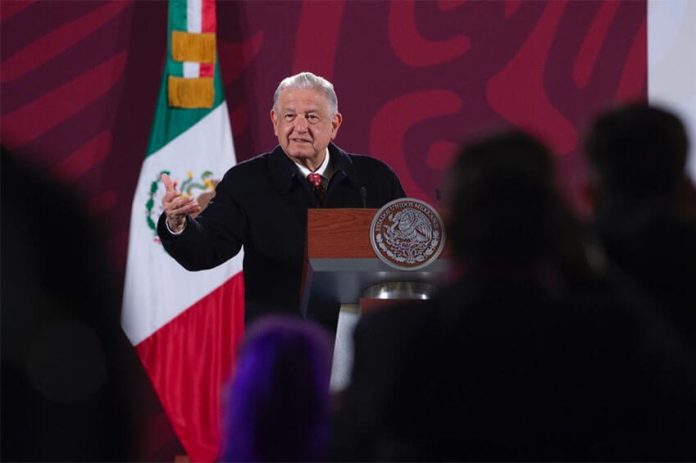President López Obrador on Wednesday advocated a “pause” in relations between Mexico and Spain, but clarified Thursday that he was referring to a “respectful protest” rather than a diplomatic “rupture.”
He told reporters at his morning news conference Wednesday that Mexico’s relations with Spain and Spanish companies – several of which invest in Mexico’s energy sector, which the government wants to overhaul in favor of the state – are strained.
In 2019, López Obrador called for the king of Spain to apologize for the conquest of Mexico, but the Spanish government “vigorously” rejected the request. He has railed against Spanish energy companies such as Iberdrola and Repsol, accusing them of abusive business practices in Mexico.
The president said he believed that a pause in Mexico-Spain relations would benefit the people of both countries. He asserted that Mexico has been “looted” for years due to “economic-political promiscuity in the leadership of the governments of Mexico and Spain.”
“… So it’s worth giving ourselves some time, a pause. Maybe when the government changes, relations will be reestablished,” López Obrador said.
“… We’re going to give ourselves time to respect each other so they don’t see us as a land of conquest. We want to have good relations with all the governments and people of the world but we don’t want them to rob us.”
The president’s remarks were rejected by the Spanish Foreign Ministry in a terse statement.
“The government of Spain categorically rejects criticisms made by the president of Mexico … in recent days against Spain and Spanish companies,” it said.
The statement also said that Spain and Mexico are “strategic partners” united by “deep human, cultural, historic, linguistic and economic ties.”
“Spain is the second largest [foreign] investor in Mexico and has 7,000 companies in the country. Spanish investment is above 70 billion euros,” it said. “… Spain will always work to maintain the best relations with Mexico and strengthen the ties with … [its] people. The government wants relations based on mutual respect, as do Spaniards and Mexicans, without these kinds of statements.”
Spanish Foreign Minister José Manuel Albares sought to downplay the importance of López Obrador’s comments given that they were made “in an informal context in response to a journalist’s question.”

They don’t “constitute an official position or statement,” he said, adding that it was unclear what the president meant.
AMLO aimed to clarify his remarks – described as “diplomatic vandalism” by one former Mexican ambassador to the United States – at his Thursday morning press conference.
“Now, with this Spain thing, Mexican internationalists felt offended because I suggested the pause. They say, ‘That doesn’t exist in foreign policy language.’ Well they’re right but how was it understood? Very well, and if it wasn’t I’m explaining it now. It’s not a rupture of relations and it’s not against the Spanish people. It’s nothing more than a respectful, fraternal protest for the abuse and offenses committed against the people of Mexico and our country,” he said.
Speaking in Belgium, Albares said that López Obrador’s latest remarks had clarified Mexico’s position, before pledging that “the Spanish government will defend the Spanish people, the good name of Spain and its companies in any circumstance and against anyone.”
The Mexican government appears intent on keeping its Spanish counterpart busy. López Obrador renewed his attacks on the Spanish firms Iberdrola, Repsol and OHL on Thursday, reaffirming that they “abused our country and our people.”
Speaking to the newspaper El País after the president’s remarks on Wednesday, a foreign trade analyst with the Mexican Institute for Competitiveness, a Mexico City-based think tank, said it was “unwise” for López Obrador to “risk our diplomatic stability with Spain and place investment in the country in doubt, particularly at a time when we’re trying to drive an economic recovery.”
The trade analyst, Ana Bertha Gutiérrez, said that investment is “fundamental for economic growth, job creation and … to improve the living conditions of the [Mexican] population.”
Juan Carlos Baker, a trade negotiator for the previous federal government, said that remarks such as those made by AMLO don’t benefit either the diplomatic or the business relationship with Spain.
“I think that [the president] is making it clear that [foreign] investment and operations in this country are not well-thought-of, which is concerning, because what the country needs is investment, growth and to attract projects that are seeking a place to set up … [to take advantage of] nearshoring,” he said.
Another threat to investment in Mexico is the government’s proposed electricity reform, which would guarantee over half the electricity market to the state-owned Federal Electricity Commission and thus limit the participation of private companies that generate renewable energy in Mexico.
The planned constitutional reform, which requires two-thirds congressional support to become law, has been criticized by the United States government, the Canadian Chamber of Commerce in Mexico, and the European Union’s ambassador to Mexico, among others.
With reports from El País, Reforma and El Universal
